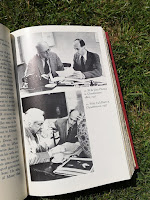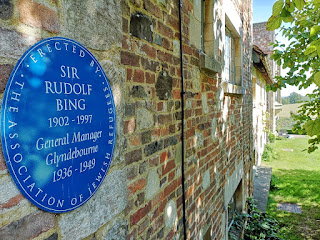Sunday 15 September 2019
Sunday 8 September 2019
Rudolf Bing at Glyndebourne
In 1934, Rudolf Bing was an experienced opera house manager who had recently lost his job in Germany as Nazi influence grew.
"The next couple of months were the darkest I knew", he later wrote in his autobiography '5000 Nights at the Opera'. But then he received "a most remarkable commission" from conductor Fritz Busch.
He was invited to help organise John Christie's new Mozart opera festival at Glyndebourne. Christie had built an opera house on his estate, contacting Fritz Busch who, in turn, had insisted he worked with artistic director Carl Ebert. Ebert and Busch organised some of the principal singers before approaching Bing to employ the rest of the performing company.
 "Everything about this enterprise seemed crazy", wrote Rudolf Bing Working from his home in Vienna, he "managed to interest some excellent artists in the Glyndebourne project, largely, of course, because it involved working with Busch and Ebert". As the season approached, Rudolf Bing wanted to learn more about this curious English opera house. In May 1934 he decided to go on his own - "nobody said anything about paying my expenses" - leaving home in Vienna with his wife Nina, who stayed temporarily with her family in Paris while Rudolf took a ferry to Newhaven.
"Everything about this enterprise seemed crazy", wrote Rudolf Bing Working from his home in Vienna, he "managed to interest some excellent artists in the Glyndebourne project, largely, of course, because it involved working with Busch and Ebert". As the season approached, Rudolf Bing wanted to learn more about this curious English opera house. In May 1934 he decided to go on his own - "nobody said anything about paying my expenses" - leaving home in Vienna with his wife Nina, who stayed temporarily with her family in Paris while Rudolf took a ferry to Newhaven.
In his book, Rudolf Bing paints a vivid picture of those early days at Glyndebourne - and his later time as General Manager of the Metropolitan Opera in New York. He talks of John Christie, his colleagues, the house and Christie's butler Childs. "On one of the first occasions that I was an overnight guest at Glyndebourne, Childs woke me with that abominable English custom, the early-morning tea, and said 'Breakfast is at eight-thirty, sir.' I said 'Good morning, Childs. What time is it now?' 'Nine o'clock, sir', he said."
A blue plaque remembering Sir Rudolf Bing can be found overlooking the Glyndebourne lawn, just round the corner from the box office.
"The next couple of months were the darkest I knew", he later wrote in his autobiography '5000 Nights at the Opera'. But then he received "a most remarkable commission" from conductor Fritz Busch.
He was invited to help organise John Christie's new Mozart opera festival at Glyndebourne. Christie had built an opera house on his estate, contacting Fritz Busch who, in turn, had insisted he worked with artistic director Carl Ebert. Ebert and Busch organised some of the principal singers before approaching Bing to employ the rest of the performing company.
 "Everything about this enterprise seemed crazy", wrote Rudolf Bing Working from his home in Vienna, he "managed to interest some excellent artists in the Glyndebourne project, largely, of course, because it involved working with Busch and Ebert". As the season approached, Rudolf Bing wanted to learn more about this curious English opera house. In May 1934 he decided to go on his own - "nobody said anything about paying my expenses" - leaving home in Vienna with his wife Nina, who stayed temporarily with her family in Paris while Rudolf took a ferry to Newhaven.
"Everything about this enterprise seemed crazy", wrote Rudolf Bing Working from his home in Vienna, he "managed to interest some excellent artists in the Glyndebourne project, largely, of course, because it involved working with Busch and Ebert". As the season approached, Rudolf Bing wanted to learn more about this curious English opera house. In May 1934 he decided to go on his own - "nobody said anything about paying my expenses" - leaving home in Vienna with his wife Nina, who stayed temporarily with her family in Paris while Rudolf took a ferry to Newhaven.In his book, Rudolf Bing paints a vivid picture of those early days at Glyndebourne - and his later time as General Manager of the Metropolitan Opera in New York. He talks of John Christie, his colleagues, the house and Christie's butler Childs. "On one of the first occasions that I was an overnight guest at Glyndebourne, Childs woke me with that abominable English custom, the early-morning tea, and said 'Breakfast is at eight-thirty, sir.' I said 'Good morning, Childs. What time is it now?' 'Nine o'clock, sir', he said."
A blue plaque remembering Sir Rudolf Bing can be found overlooking the Glyndebourne lawn, just round the corner from the box office.
Subscribe to:
Posts (Atom)

